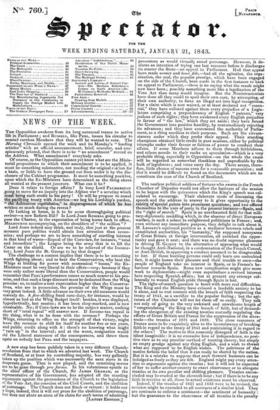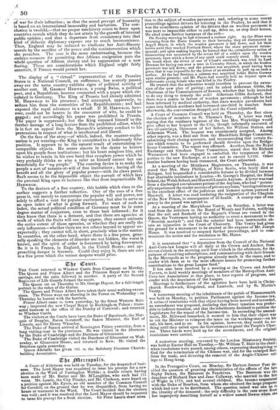The restless political soldiers of fortune who swarm in the
French Chamber of Deputies would not allow the business of the session to be begun with the quiescence which the King's speech was cal- culated to encourage. Their elaborate mode of discussing the speech and the address in answer to it gives opportunity to the raising of special points into prominent questions; and two offered themselves to the uses of party in the present instance—Spain, and the " right of search." Spain is an unexhausted field for that mili- tary-diplomatic meddling which, in the absence of direct European warfare, is such a solace to enlightened politicians in France ; and, even without any immediate purpose, they delight to talk about it. M. LESSEPS'S equivocal position as a mediator between rebels and constituted authorities, his "humanity," the supposed annoyance of Great Britain at foreign intervention, all enriched the oppor- tunity and gave it zest ; and there was no doubt supreme pleasure in driving M. GUIZOT to the alternative of appearing what would be thought Anti-National, in a condemnation of the French Consul, or Anti-British, in approving a conduct assumed to be disagreeable to her. If those bustling persons could only learn one undoubted fact, it might lessen their pleasure and their trouble at once—the people of England take no interest in Spain, or in France's be- haviour towards Spain. Some new complication might give more work to diplomatists—might even superinduce a revived interest here respecting Spanish affairs ; but at present any attempt col- laterally to wound English pride through Spain is lost. The right-of-search question is beset with more real difficulties. The King and the Ministry have evinced a laudable anxiety to let it alone, and to rest content with the breach of faith respecting the treaty of 1841, as a sacrifice to the popular feeling ; but the agi- tators of. the Chababer will not let them off so easily. They talk ,not only of going to the very awkward and unwelcome length of " congratulating " the King on the breach of faith, but of demand- ing the abrogatioe.of the existing treaties mutually regulating the efforts of Great Britain and France for the suppression of the slave- trade—the treaties of 1831 and 1833. The close reasoners of'
France seem to be exquisitely alive to the inconsistency of breaking faith in regard to the treaty of 1841 and maintaining it in regard to the others ! The motive to this unseemly disregard of faith is the idlest imaginable : it is no excessive love of independence, no posi- tive view as to any peculiar method of treating slavery, but simply an empty grudge against any thing English, and a wish to thwart what are supposed to be English wishes. The paltriness of the motive forbids the belief that it can really be shared by the nation. But it is a mistake to suppose that such froward humours can be indulged as freely as they are felt. England might pay every atten- tion to arguments against the treaties ; but it will not be expected of her to suffer another country to exact observance or to abrogate treaties at its own peculiar and shifting pleasure. Treaties uncon- eluded may be evaded at the eleventh hour ; but if there is to be any faith in treaties at all, those in actual existence must be observed.
Indeed, if the treaties of 1831 and 1833 were to be revised, the revision might be extended to all contracts of a similar kind. They are contracts to enforce a sentiment—the sentiment of humanity : but the guarantee to the observance of all treaties is the penalty
of war for their infraction ; so that the moral precept of humanity is based on an international immorality and barbarism. The con- clusion is twofold,—that no proper machinery exists to force upon countries morals which they do not attain by the growth of internal public opinion ; and that a departure from consistency into that kind of didactic diplomacy exposes one to much inconvenience. Thus, England may be reduced to vindicate her Anti-Slavery morals by the sacrifice of the peace and the nonintervention which she preaches. The case is the more embarrassing, because the embryo measure for permitting free African emigration puts the -whole question of African slavery and its suppression on a new footing. These are considerations which England might fairly entertain, if France would permit her.



























 Previous page
Previous page